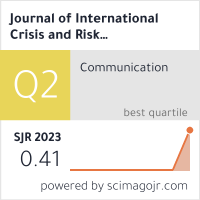Engaging Communities in Emergency Risk and Crisis Communication: A Systematic Review and Evidence Synthesis
Keywords:
Community engagement; crisis; emergency risk communicationAbstract
The World Health Organization (WHO) commissioned systematic reviews to assist with the development of new emergency risk communication guidelines that will impact responses and distribution of resources at all levels. This mixed-method evidence synthesis, guided by Cochrane principles and methods, examined the extant research in countries throughout the world, published from 2003 to 2016, related to the best practices to engage communities in preparing for and responding to emergency events with public health implications. Although few studies directly examined which strategies or tactics effectively engage public participation, many studies reinforced the importance of community participation. The findings support the perspective that emergency events are communicatively understood by all publics and that they benefit from emergency risk communication before, during, and after such events, especially when grounded in local contexts. Although the importance of local context limits the generalizability of risk communication, it is important to continue studying strategies and tactics to cultivate participation among all stakeholders.Downloads
Published
2019-03-11
Issue
Section
Articles
How to Cite
Engaging Communities in Emergency Risk and Crisis Communication: A Systematic Review and Evidence Synthesis. (2019). Journal of International Crisis and Risk Communication Research, 2(1). https://jicrcr.net/index.php/jicrcr/article/view/35










